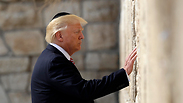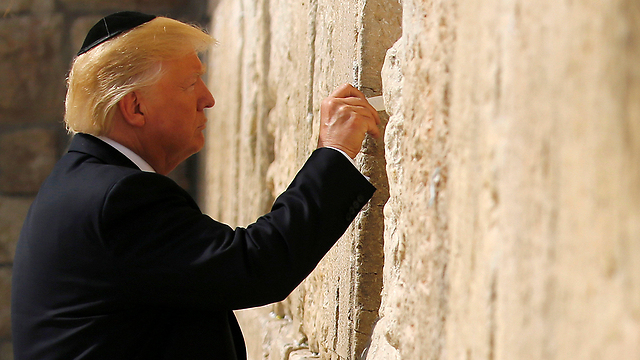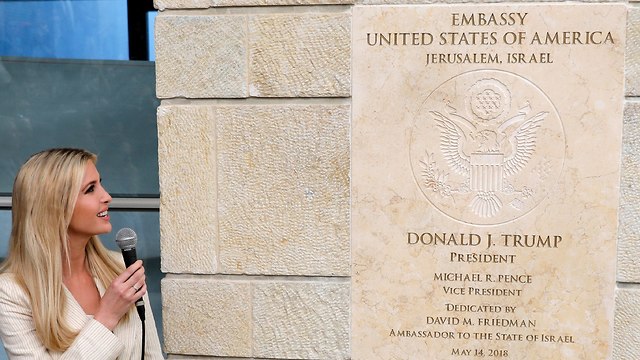
President Trump visits the Western Wall
Photo: AP

Israel worried US peace plan will include Jerusalem as Palestinian capital
The Americans are trying to pacify Abbas, who is furious over the recognition of Jerusalem as Israel's capital, and bring him back to the negotiating table; however, Israel still has friends in Washington who will oppose such a move.
Israel is worried the American peace plan would include a declaration of Jerusalem as the capital of two states—Israel and Palestine—in an effort to convince Palestinian President Mahmoud Abbas to return to the negotiating table.
The Palestinians have been boycotting Washington since President Donald Trump recognized Jerusalem as Israel's capital. According to Israeli diplomatic officials, the Americans have since been trying to figure out how to pacify the Palestinian leader while at the same time also get the backing of the Arab world for the peace plan.
Israeli officials are worried that one of the enticements the White House might present to Abbas would be mentioning Jerusalem as the future capital of the Palestinian state.
"Trump wants a deal and he's very serious," a senior Israeli official said. "To the Americans, the Israeli-Palestinian conflict is relatively easy to resolve and is ripe for the picking."
The official said that if the Republicans lose power in the upcoming midterm elections, Trump might increase his efforts to reach a solution to the Israeli-Palestinian conflict so he could run for his second term with a big foreign policy achievement under his belt.
Including Jerusalem as a future Palestinian capital in the American peace plan could put Prime Minister Benjamin Netanyahu in a bind, especially if he's to call early elections. Netanyahu could stress to the Americans that such a recognition would raise a lot of objection on the right-wing and make it harder for him to build a coalition.
In such a case, the prime minister would likely ask to postpone the release of the peace plan until after the elections in Israel. The Americans are planning to release the plan by the end of 2018 or in early 2019.
In any case, there are quite a few influential figures in Washington who would work to ensure such a promise will not be given to the Palestinians, including US Ambassador to Israel David Friedman.
Senior Israeli officials revealed that the Trump administration has been working off three principles in forming the peace plan: anyone coming to the negotiating table would have to make concessions, and there would be no one-sided concessions; anyone leaving the negotiating table would pay a price; and anyone rejecting the presented outline will risk the next outline being more to his disadvantage.
Meanwhile, businessman and World Jew Congress President Ron Lauder, a friend of Trump, was recruited to help facilitate reconciliation between Abbas and the American president.
Last week, Lauder met with Palestinian chief negotiator Saeb Erekat and Palestinian intelligence head Majed Faraj, Abbas's close confidant.
While the White House denied Lauder was sent by Trump, he took advantage of the meetings to try to convince Abbas to return to the negotiating table with the American administration because the "deal of the century" will be better than he thinks.

















